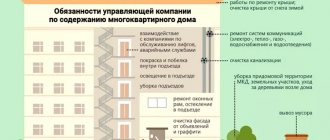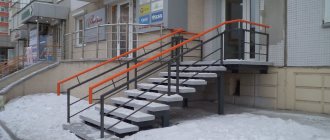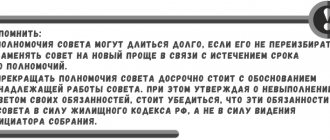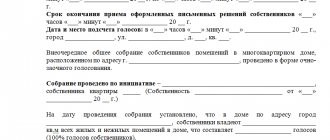Article 48 of the RF Housing Code. Voting at a general meeting of premises owners in an apartment building
1. Each owner of premises in an apartment building has the right to take part in the life of this building, in connection with which Part 1 of this article grants the right to vote at the general meeting of owners of premises in an apartment building to all owners of premises in the specified building. Persons who are not the owners of premises in a given building do not have the right to participate in voting at the general meeting of premises owners. However, this Code gives the right to owners of premises in an apartment building to participate in voting through their representatives.
2. The Housing Code of the Russian Federation directly provides for the possibility of participation in the general meeting of owners of premises in an apartment building, both personally and through a representative, without limiting in any way the right of choice of such owners.
Representation relations can be based on a power of attorney, an indication of the law, or an act of an authorized state body or local government body (this is typical for vesting the corresponding powers with representatives of such owners as the Russian Federation, constituent entities of the Federation and municipalities).
A power of attorney is a written authority issued by one person to another for representation before third parties.
According to Art. 182 of the Civil Code of the Russian Federation are not representatives of persons acting, although in the interests of others, but on their own behalf (for example, executors of inheritance, commercial intermediaries), as well as persons authorized to enter into negotiations regarding possible future transactions.
When drawing up a power of attorney, this Code requires compliance with the provisions of paragraphs 4 and 5 of Article 185 of the Civil Code of the Russian Federation or notarization. A power of attorney issued by the owner of premises in an apartment building can be certified by the organization in which he works or studies, the housing maintenance organization at his place of residence and the administration of the inpatient medical institution in which he is being treated. A power of attorney on behalf of a legal entity is issued signed by its head or another person authorized to do so by its constituent documents, with the seal of this organization attached. If for some reason the principal - the owner of the premises - does not fulfill these conditions, then the power of attorney must be given a notarial form.
3. By establishing the unconditional possibility of participation in the general meeting of each of the owners of premises in an apartment building, this Code proceeds from the fact that the weight of their votes, their influence on the formation of the decision of the meeting may be different. It seems quite logical that the number of votes belonging to each owner of the premises is proportional to his share in the common property of the owners of premises in an apartment building.
In accordance with Article 15 of the Introductory Law, the share in the right of common ownership of common property in an apartment building is proportional to the size of the total area of the premises owned by the right of ownership in the apartment building, if a decision of the general meeting of owners of the premises or other agreement of all participants in the share was adopted before the entry into force of the Introductory Law ownership of common property in an apartment building has not been established otherwise.
4. Part 4 of this article establishes the rule according to which voting on issues on the agenda of the general meeting occurs through written decisions of the owners of premises in an apartment building. Moreover, the use of written decisions of premises owners in this case is not mandatory. In this decision, the owner on each issue put to a vote must leave only one of the voting options - “for”, “against” or “abstained” (in accordance with Part 3 of Article 47 of this Code).
5. Part 5 of this article establishes the rules for voting on agenda items, conducted in the form of absentee voting. It is mandatory and provides for voting by written decisions of the owners of premises in an apartment building on issues put to vote. The requirements for such decisions are set out in Part 3 of Article 47 of this Code (see also the commentary to Part 3 of Article 47 of this Code).
6. This article provides for the procedure for voting through written decisions of the owners of premises in an apartment building on issues put to vote.
The article establishes that the votes of premises owners are counted only if their decision indicates only one answer from the possible options for each of the questions posed. Thus, when voting, the owner of the premises must choose only one from the possible options “for”, “against”, “abstained”, and so on for each issue put to vote, respectively.
If these decisions are drawn up in violation of the provisions of this Code, then such decisions are recognized as invalid and votes on the issues contained in them, accordingly, are not counted.
If the said decision of the owner of the premises contains several issues put to a vote, failure to comply with the provisions of this Code in relation to one or more of the issues put to a vote does not entail the recognition of the said decision as invalid as a whole.
Article 48 of the Housing Code of the Russian Federation
1. The right to vote at a general meeting of owners of premises in an apartment building on issues put to vote belongs to the owners of premises in this building. Voting at a general meeting of owners of premises in an apartment building is carried out by the owner of the premises in this building, both personally and through his representative.
2. A representative of the owner of premises in an apartment building at a general meeting of owners of premises in this building acts in accordance with the powers based on the instructions of federal laws, acts of authorized state bodies or acts of local government bodies, or a written power of attorney for voting. The power of attorney for voting must contain information about the represented owner of the premises in the corresponding apartment building and his representative (name or designation, place of residence or location, passport details) and must be drawn up in accordance with the requirements of paragraphs 3 and 4 of Article 185.1 of the Civil Code of the Russian Federation or notarized.
3. The number of votes that each owner of premises in an apartment building has at a general meeting of owners of premises in this building is proportional to his share in the right of common ownership of common property in this building.
4. Voting on issues on the agenda of the general meeting of owners of premises in an apartment building can be carried out through written decisions of the owners on issues put to vote.
4.1. Voting on issues on the agenda of the general meeting of owners of premises in an apartment building, held in the form of in-person and absentee voting, is carried out through written decisions of the owners on the issues put to vote.
5. Voting on issues on the agenda of a general meeting of owners of premises in an apartment building, held in the form of absentee voting, is carried out only through written decisions of the owners on issues put to vote, except for the case provided for in Article 47.1 of this Code.
5.1. When holding a general meeting through in-person, in-person, absentee or absentee voting, the owner’s decision on issues put to vote, which is included in the minutes of the general meeting, must indicate:
1) information about the person participating in voting;
2) information about the document confirming the ownership of the person participating in the vote to the premises in the corresponding apartment building;
3) decisions on each issue on the agenda, expressed in terms of “for”, “against” or “abstained”.
6. When voting is carried out through written decisions of the owners on issues put to vote, votes are counted on issues for which the owner participating in the vote has left only one of the possible voting options. These decisions drawn up in violation of this requirement are declared invalid, and votes on the issues contained in them are not counted. If the owner’s decision on issues put to a vote contains several issues put to a vote, failure to comply with this requirement in relation to one or more issues does not entail invalidation of the said decision as a whole.
Commentary on Article 48
1 - 2. The Code grants the right to vote at a general meeting of owners of premises in an apartment building only to owners of premises in the specified building (Part 1, Article 48). This provision is established in a mandatory norm, therefore no other persons have the right to participate in decision-making at such a meeting.
The owner of premises in an apartment building has the right, but is not obliged, to personally participate in voting at the general meeting of such owners. The owner of the premises has the right to authorize his representative to vote at the meeting on behalf of the owner. This authority may stem from the content of federal laws, as well as other legal acts of state or municipal bodies (this is typical for vesting the corresponding powers with representatives of such owners as the Russian Federation, constituent entities of the Federation and municipalities). The specified authority may also follow from a power of attorney executed in compliance with the imperative requirements of Part 2 of Art. 48 of the Code (in this way representatives of any owners of premises can be authorized).
A power of attorney for voting can be given a notarial form according to the rules established by the Fundamentals of the Legislation of the Russian Federation on Notaries dated February 11, 1993. If for some reason the owner of the premises in an apartment building does not consider it appropriate to notarize the specified power of attorney, then it must be executed according to the rules of paragraphs 4 and 5 of Art. 185 of the Civil Code of the Russian Federation.
——————————— Vedomosti RF. 1993. N 10. Art.
357; NW RF. 2001. N 53 (part 1). Art. 5030; 2003. N 50. Art. 4855; 2004. N 27. Art. 2711; N 35. Art. 3607; N 45. Art. 4377; 2005. N 27. Art. 2717.
Let us recall that in this case, the power of attorney on behalf of the citizen is certified by the organization in which the principal works or studies, or by the housing maintenance organization at his place of residence, or by the administration of the inpatient medical institution in which he is being treated. A power of attorney on behalf of a legal entity is issued signed by its head or another person authorized to do so by its constituent documents, with the seal of the organization on behalf of which the power of attorney was issued. It must be remembered that a power of attorney that does not indicate the date of its execution is void (see paragraph 1 of Article 186 of the Civil Code of the Russian Federation and the commentary thereto).
——————————— On the execution of powers of attorney, see in detail: Powers of attorney: comments, official explanations, judicial practice and sample documents / Ed. M.Yu. Tikhomirov. M.: Publishing house. Tikhomirova M.Yu., 2010; https://www.urkniga.ru.
3. As already noted, at a general meeting of owners of premises in an apartment building, shares, not individuals, vote. The number of votes that each owner of a premises in an apartment building has at a general meeting of owners of premises in a given building is proportional to his share in the right of common ownership of the common property in that building.
The share in the right of common ownership of common property in an apartment building of the owner of the premises in this building is proportional to the size of the total area of the specified premises (see Part 1 of Article 37 of the Code). Therefore, the number of votes that the owner of premises in an apartment building has at a general meeting of such owners directly depends on the size of the total area of residential or non-residential premises owned by him in this apartment building (except for the cases specified in Article 15 of the Introductory Law).
4 - 6. The Code does not directly provide for the use of voting ballots when voting at a general meeting of premises owners. Instead of ballots, he proposes documents such as decisions of premises owners, drawn up in writing. In this decision, the owner on each issue put to a vote must leave only one of the voting options - “for”, “against” or “abstained”.
Please note that written decisions of premises owners on issues put to vote, in accordance with Part 5 of Art. 48, must be used only when holding a general meeting in the form of absentee voting (see also Article 47 of the Code). When voting at a general meeting of premises owners, held in the form of joint presence, both the indicated written decisions and other documents, for example, voting ballots, etc., can be used.
Let us recall that in Part 3 of Art. 47 of the Code establishes requirements for the content of the owner’s decision on issues put to vote in the case when the general meeting is held in the form of absentee voting. However, these requirements are not prohibited from being followed even when the general meeting of premises owners is held in the form of joint presence (although in this case these requirements are not mandatory).
Section 3. RESIDENTIAL PREMISES PROVIDED UNDER SOCIAL TENANCY CONTRACTS







